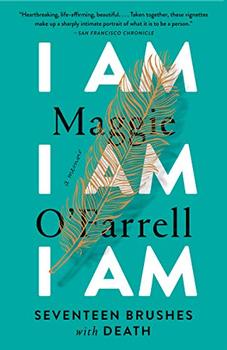Summary | Excerpt | Reading Guide | Reviews | Beyond the Book | Readalikes | Genres & Themes | Author Bio

Seventeen Brushes with Death
by Maggie O'Farrell
I never knew if they caught him, if he was convicted, sentenced, imprisoned. I had the distinct feeling, during the interview, that those detectives were on to him, that they had him, that they just needed my corroboration. Maybe the DNA samples were incontrovertible. Maybe he confessed. Maybe there were other witnesses, other victims, other near-misses, who gave evidence in court: I was never asked and was too green or, I suspect, too shocked to pursue the matter, to call the police and say, what happened, did you catch him, has he been put away? I left the area not long afterwards so can never be certain. All this happened long before a time of ubiquitous and instantly available news. I can find no sign, no trace of this crime on the internet, despite numerous searches.
I don't know why he spared me but not her. Did she panic? Did she try to run? Did she scream? Did she make the mistake of alerting him to the monster he was?
For a long time, I dreamt about the man on the path. He would appear in a variety of disguises, but always with his rucksack and binoculars. Sometimes, in the murk and confusion of a dream, I would recognise him only by these accoutrements and I would think, oh, it's you again, is it? You've come back?
It is a story difficult to put into words, this. I never tell it, in fact, or never have before. I told no one at the time, not my friends, not my family: there seemed no way to translate what had happened into grammar and syntax. I have, now I think about it, only ever told one person, and that was the man I would eventually marry, and it only came out years after we first met. I told him one evening in Chile, as we sat together in the refectory of a travellers' hostel. The expression on his face was one of such deep, visceral shock that I knew I would probably never tell it again, verbally, in my lifetime.
What happened to that girl, and what so nearly happened to me, is not something to be lightly articulated, moulded into anecdote, formed into a familiar spoken groove to be told and retold over a dinner table or on the telephone, passed from teller to teller. It is instead a tale of horror, of evil, of our worst imaginings. It is a story to be kept battened down in some wordless, unvisited dark place. Death brushed past me on that path, so close that I could feel its touch, but it seized that other girl and thrust her under.
I still cannot bear anyone to touch my neck: not my husband, not my children, not a kindly doctor, who once wanted to check my tonsils. I flinch away before I even register why. I can't wear anything around it. Scarves, polo necks, choker necklaces, any top or blouse that applies pressure there: none of these will ever be for me.
My daughter recently pointed to the top of a hill, seen on our walk to school.
"Can we go up there?" "Sure," I said, glancing up at the green summit. "Just you and me?" I was silent for a moment. "We can all go," I said. "The whole family." Alert as ever to the moods of others, she immediately caught the sense that I was holding something back. "Why not just you and me?"
"Because ... everyone else would like to come too." "But why not you and me?" Because, I was thinking, because I cannot begin to say.
Because I cannot articulate what dangers lie around corners for you, around twisting paths, around boulders, in the tangles of forests. Because you are six years old. Because there are people out there who want to hurt you and you will never know why. Because I haven't yet worked out how to explain these things to you. But I will.
Excerpted from I Am, I Am, I Am by Maggie O'Farrell. Copyright © 2018 by Maggie O'Farrell. All rights reserved. No part of this excerpt may be reproduced or reprinted without permission in writing from the publisher.
We must believe in luck. For how else can we explain the success of those we don't like?
Click Here to find out who said this, as well as discovering other famous literary quotes!
Your guide toexceptional books
BookBrowse seeks out and recommends the best in contemporary fiction and nonfiction—books that not only engage and entertain but also deepen our understanding of ourselves and the world around us.